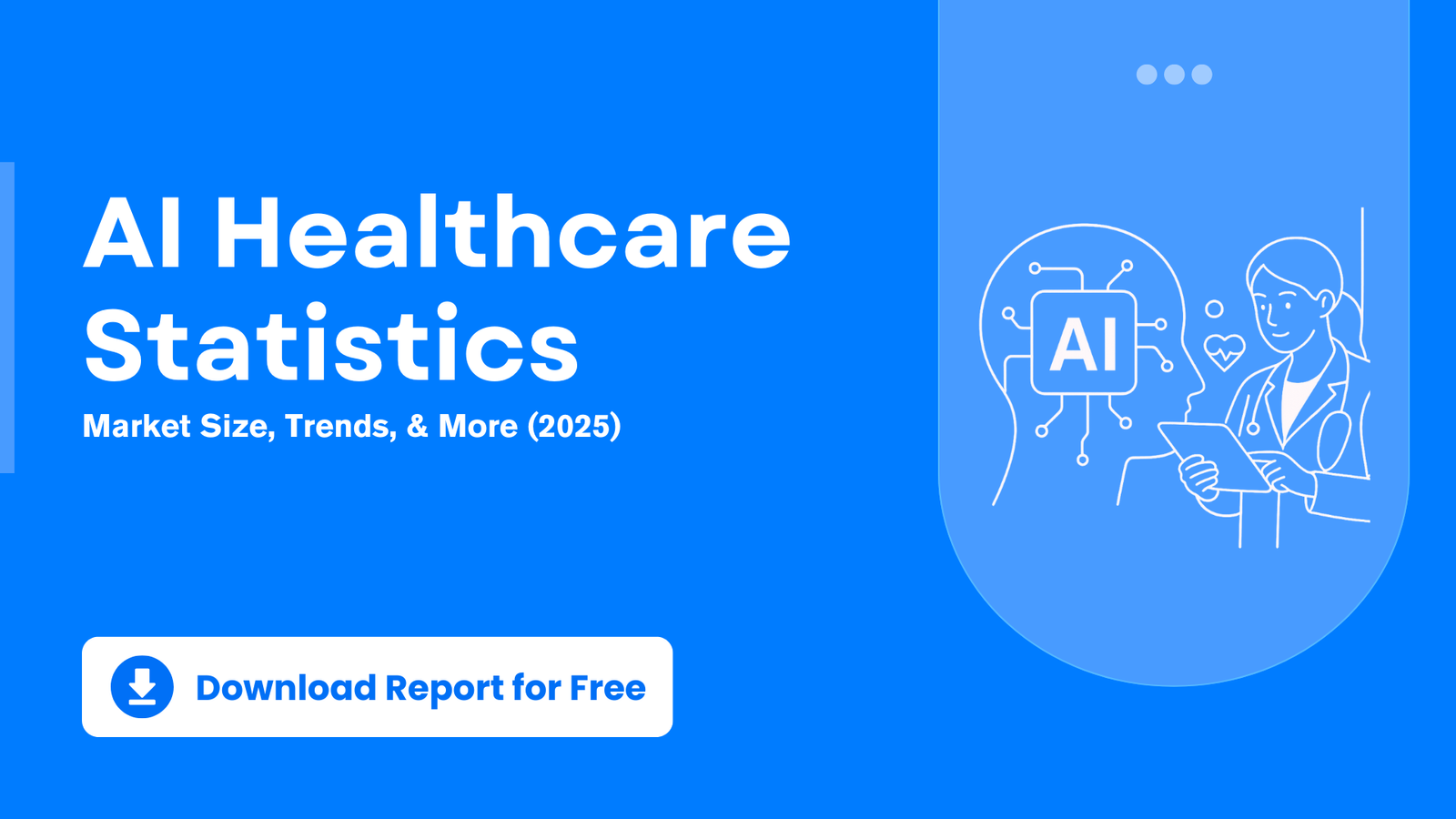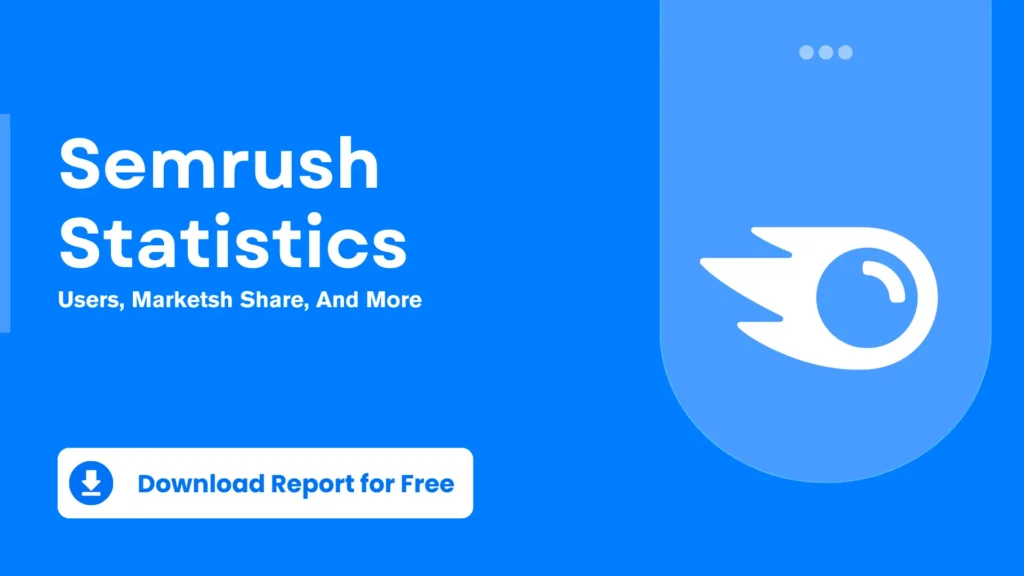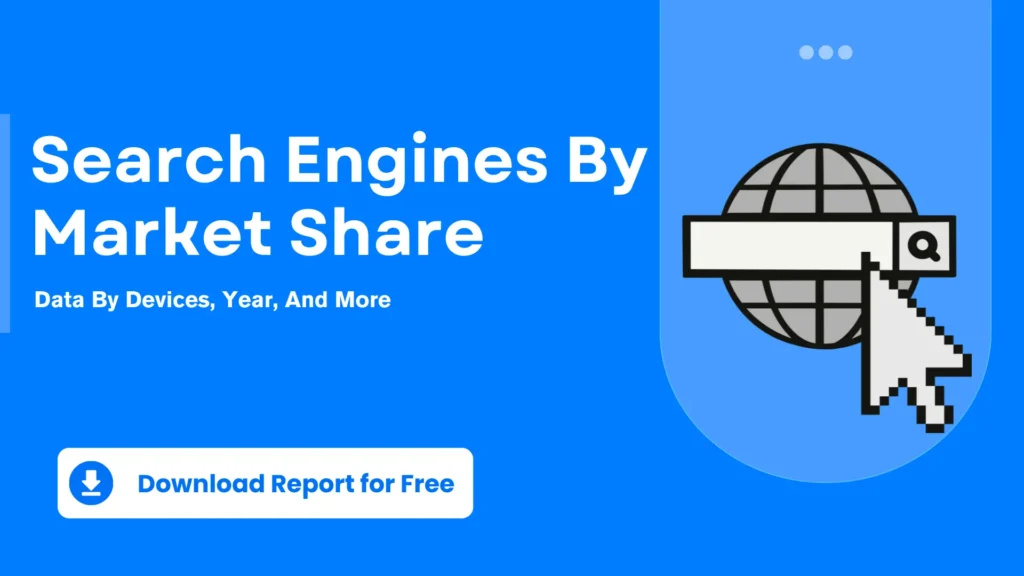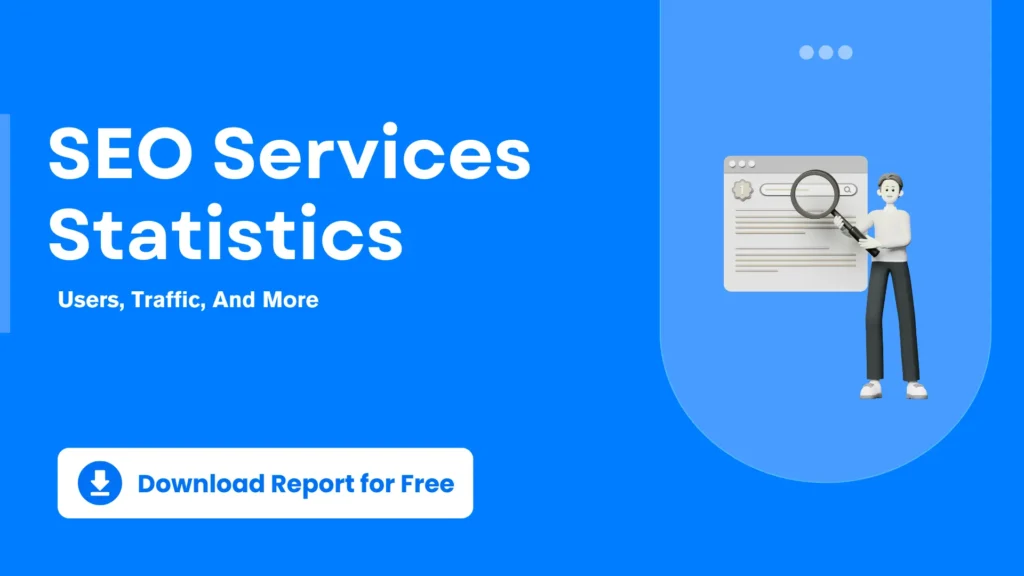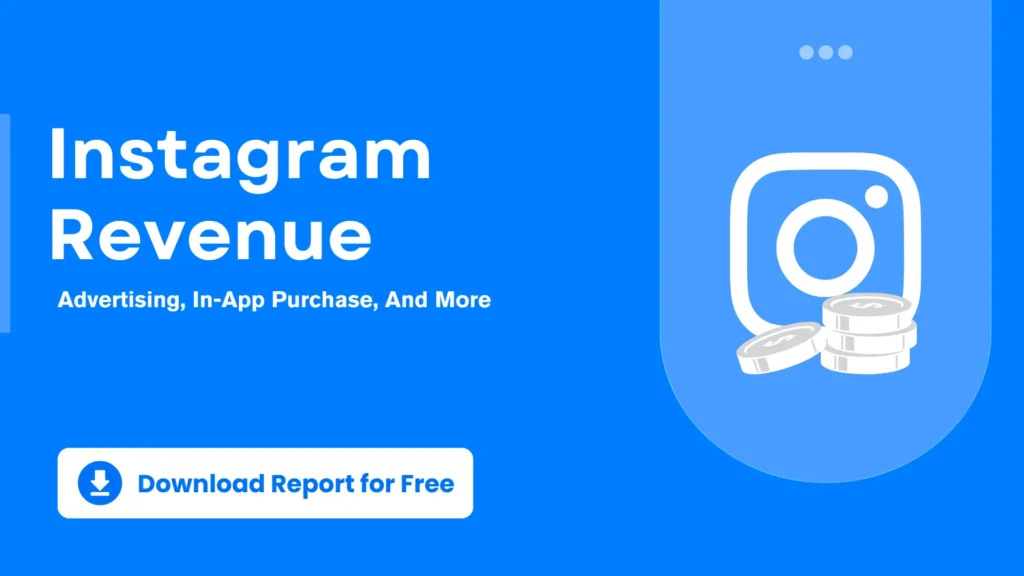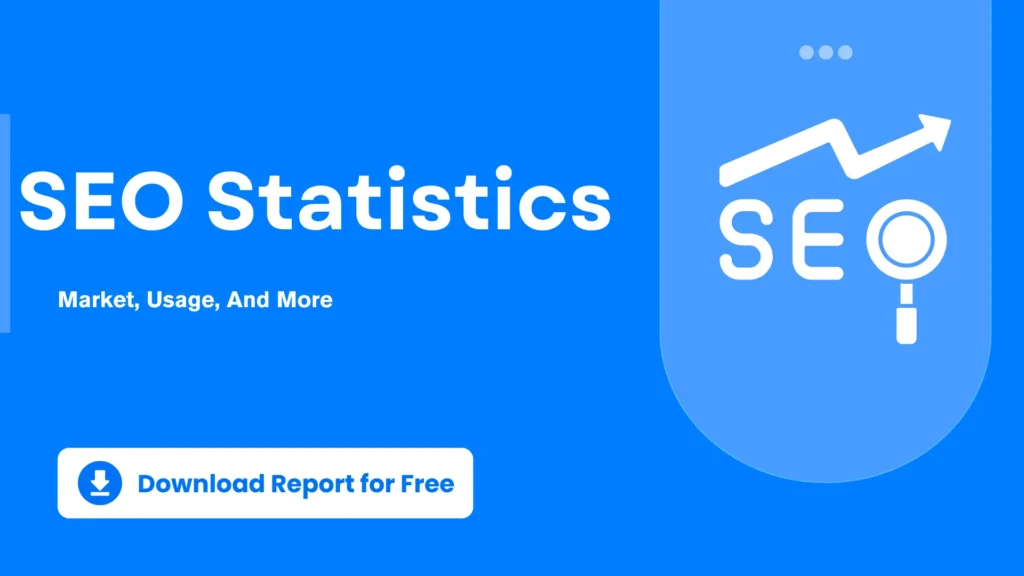As the use of artificial intelligence continues to grow, the global AI in healthcare market has skyrocketed from $1.2 billion in 2016 to an estimated $46 billion in 2025, and it is projected to reach nearly $208.2 billion by 2030.
In the US, the market is expected to expand from $11.8 billion in 2023 to over $102 billion by 2030, reflecting increasing adoption of AI-powered solutions across hospitals, clinics, and health systems.
In this post, you will get to know the most influential statistics regarding the use, adoption of AI in the healthcare sector and trends that are making an impact in 2025.
Top AI Healthcare Statistics (2025 Insights)
- The AI in healthcare market is valued at $46 billion in 2025.
- 80% of Americans believe AI in healthcare can improve care quality, reduce costs, and increase accessibility.
- 75% of leading healthcare companies are testing or planning to expand the use of AI across operations.
- 64% of patients are ready to use AI-powered virtual nurse assistants.
- 83% of US consumers are concerned AI might make mistakes, and 86% worry about transparency.
AI Healthcare Market Statistics (2016 to 2030)
The global AI in healthcare market is projected to grow from about $32.3 billion in 2024 to nearly $208.2 billion by 2030. This represents an annual growth rate of approximately 38.6%.
In 2023, the market was estimated at $19.3 billion, underscoring how rapidly this sector is expanding.
The market picked up momentum in 2022, reaching around $12–15 billion.
From under $2 billion in 2016 to over $200 billion by 2030, this market is multiplying more than 100x in 14 years.
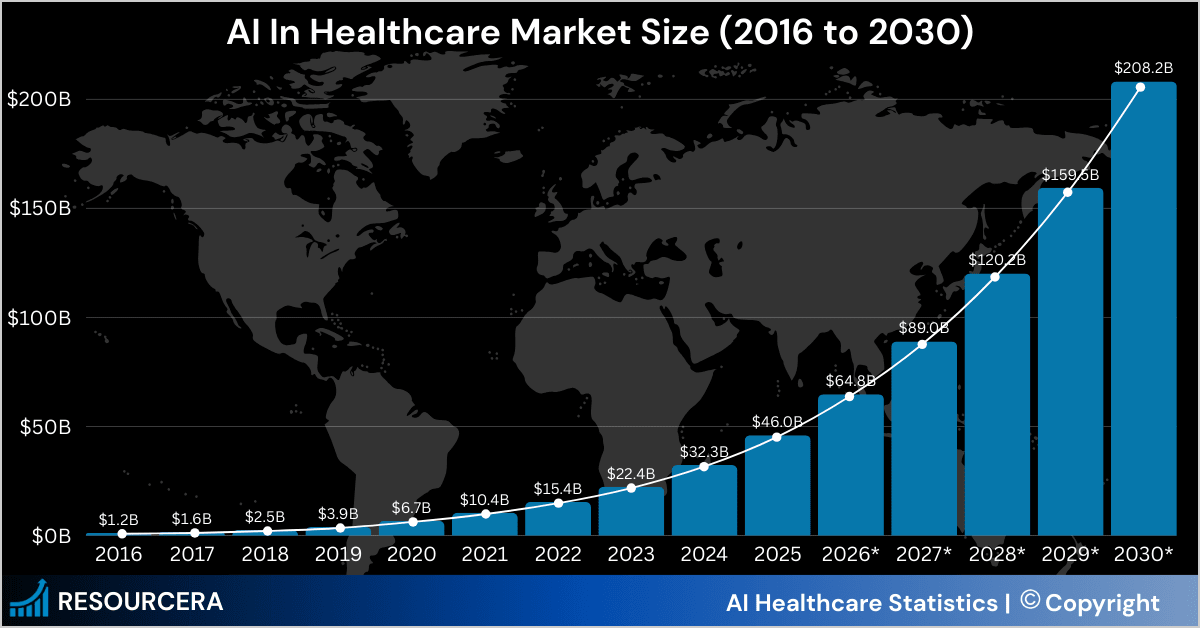
Here is a clear table showing the Global AI in Healthcare Market from 2016 to 2030:
| Year | AI in Healthcare Market Size |
|---|---|
| 2016 | $1.2 billion |
| 2017 | $1.6 billion |
| 2018 | $2.5 billion |
| 2019 | $3.9 billion |
| 2020 | $6.7 billion |
| 2021 | $10.4 billion |
| 2022 | $15.4 billion |
| 2023 | $22.4 billion |
| 2024 | $32.3 billion |
| 2025 | $46 billion |
| 2026* | $64.8 billion |
| 2027* | $89 billion |
| 2028* | $120.2 billion |
| 2029* | $159.5 billion |
| 2030* | $208.2 billion |
Source: Grand View Research
AI In Healthcare Market Size In The US
As of 2025, the AI in healthcare market in the United States is valued at $21.9 billion in 2023 and is projected to increase to nearly $102.2 billion by 2030.
The US AI in healthcare market is forecast to expand at a strong CAGR of 36.1% between 2024 and 2030.
| Year | U.S. AI In Healthcare Market Revenue |
|---|---|
| 2023 | $11.8 billion |
| 2024 | $16 billion |
| 2025 | $21.9 billion |
| 2026* | $29.7 billion |
| 2027* | $40.4 billion |
| 2028* | $55 billion |
| 2029* | $74.7 billion |
| 2030* | $102.1 billion |
Source: Grand View Research
AI in Healthcare Market Size In Different World Regions
The North American AI in healthcare market was valued at $12.95 billion in 2023 and is projected to grow rapidly at a CAGR of 36.3% from 2024 to 2030.
The European AI in healthcare market reached $4.28 billion in 2023 and is expected to expand at a CAGR of 37.3% between 2024 and 2030.
The UK AI in healthcare market was valued at $1.33 billion in 2023 and is projected to reach $12.49 billion by 2030, growing at a remarkable CAGR of 37.8% from 2024 to 2030.
Meanwhile, the Asia Pacific region showed a revenue of $4.6 billion in 2023 and is expected to grow at a 40.9% CAGR between 2024 and 2030.
The AI in healthcare market in Australia generated a revenue of $197.6 million in 2023 and is projected to reach $2,157.3 million by 2030.
Let’s look at these numbers in a simple table:
| Region | AI in Healthcare Market Size |
|---|---|
| North America | $12.95 billion |
| Europe | $4.28 billion |
| Asia Pacific | $4.6 billion |
| Australia | $197.6 million |
| United Kingdom | $1.33 billion |
Sources: Grand View Research 1, Grand View Research 2, Grand View Research 3, Grand View Research 4
AI in Healthcare Adoption & Trust Statistics
Eight in ten Americans believe AI can improve healthcare quality, reduce costs, and make care more accessible. About 60% of healthcare leaders using generative AI are already seeing a positive return on investment or expect to see one.
81% of physicians say generative AI will improve how care team interact with patients.
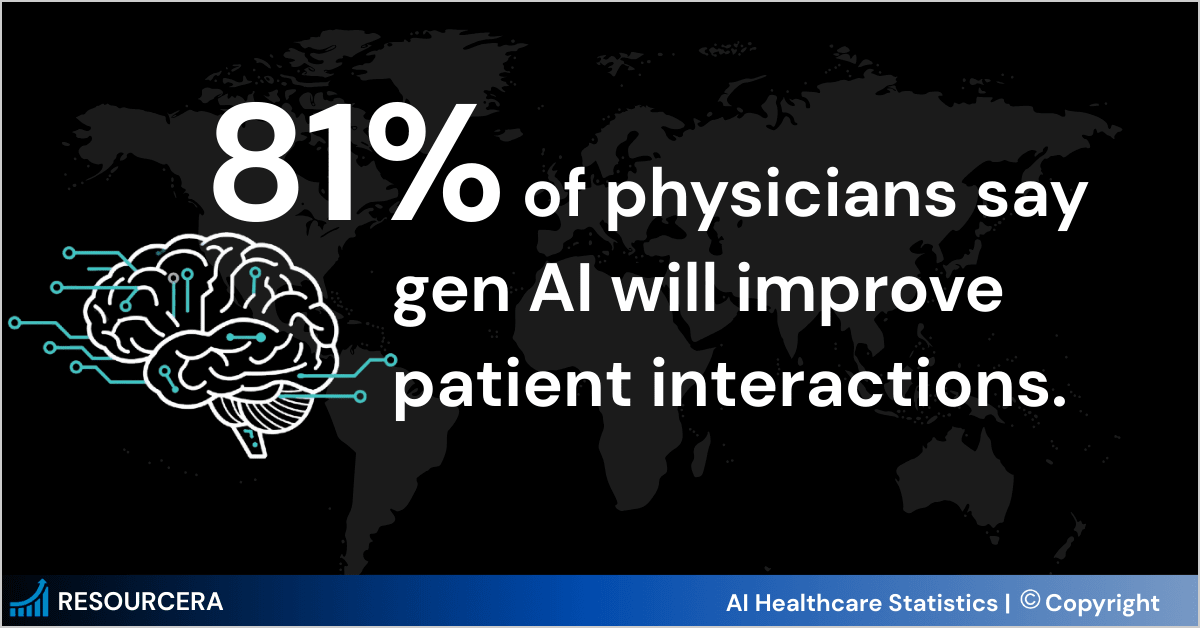
A survey found that consumers are open to using AI in several areas of healthcare. About 71% are comfortable with AI informing them about new treatments, 66% with AI helping to review and interpret lab results, and 62% with AI interpreting imaging results.
In addition, 58% are comfortable with AI determining the best treatments and medications, 54% with assessing the urgency of care, and 51% with diagnosing their condition.
Three in five physicians (59%) say AI can save time by summarizing patient data from electronic health records (EHRs).
Sources: McKinsey, Forbes, Tebra, Wolters Kluwer
Perception of AI in Healthcare by Gender
Data from the Pew Research Center shows that women are more uncomfortable with AI in healthcare than men. 54% of men said they were very or somewhat uncomfortable, which is 12% less than women.
Overall, two-thirds of women (66%) reported being very or somewhat uncomfortable with AI’s prominent role in healthcare.
Source: Pew Research
Generative AI in Healthcare Statistics
Opinions on how fast AI is being used in healthcare differ. 41% of people think it’s too slow, 32% think it’s just right, and 27% think it’s happening too fast.
75% of top healthcare companies are testing or planning to expand Generative AI across their operations.
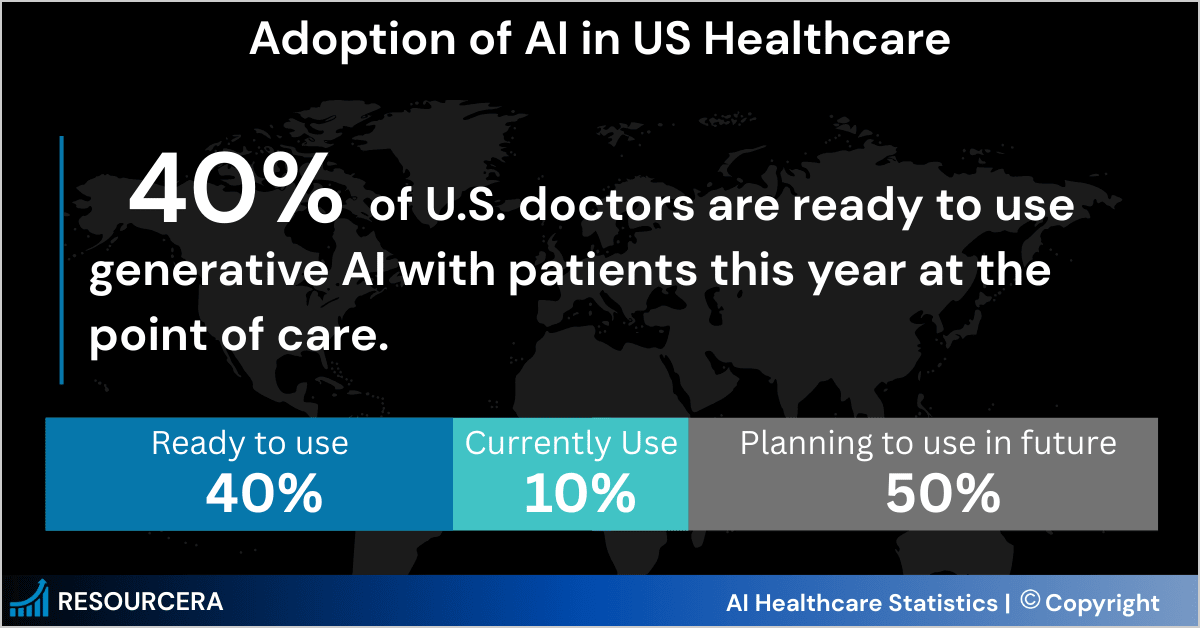
40% of U.S. doctors are ready to use generative AI with patients this year at the point of care. At the same time, over 10% of US healthcare professionals currently use AI, and almost 50% plan to use it in the future.
Meanwhile, 42% of physicians think AI will be just another factor making healthcare more complicated. 40% of physicians feel AI is overhyped and may not live up to expectations.
Sources: Tebra, Wolterskluwer, McKinsey, Becker’s Hospital Review, Deloitte, Athena Health
Patient and Public Opinions on AI in Healthcare
64% of patients would feel comfortable using AI-powered virtual nurse assistants. Additionally, one in five consumers who used generative AI for health and wellness did so to learn about medical conditions.
One in four Americans said they would not visit a healthcare provider who refuses to use AI technology. Moreover, one in four Americans is more likely to use an AI chatbot than go to therapy.
38% of Americans believe AI will improve healthcare outcomes, 33% think it will make outcomes worse, and 27% feel it will make no difference.
64% of patients would feel comfortable using AI-powered virtual nurse assistants. Additionally, one in five consumers who used generative AI for health and wellness did so to learn about medical conditions.
Sources: Tebra, Pew Research, Deloitte, Syneos Health Communications
AI Healthcare Challenges & Barriers Statistics
ChatGPT misdiagnosed 83 out of 100 pediatric cases, highlighting concerns about AI accuracy in healthcare.
86% of Americans worry that generative AI lacks transparency regarding where information comes from and how it is validated, while 89% of physicians want vendors to clearly disclose sources, creators, and data origins.
Similarly, 82% of the US consumers are concerned that AI may rely on unfiltered internet information.
The potential for mistakes is a major barrier, with 83% of US consumers and 49% of Americans overall expressing concern that generative AI might produce false information.
In the professional community, 42% of healthcare professionals remain unenthusiastic about AI due to concerns over human interaction and data privacy
Also, 80% of Americans feel that a lack of understanding and evidence of improved health outcomes is a significant risk for adopting AI in healthcare.
Despite these advancements, 53% of Americans believe AI cannot replace the experience of human health experts, and 43% still prefer human interaction and touch in their care.
Sources: PSNet, Wolters Kluwer, Medtronic, McKinsey, Tebra, Wolters Kluwer 2
The Future Of Healthcare In AI: Trends For 2025
Healthcare is now leading generative AI adoption, with $500 million in enterprise spending, signaling a significant shift from traditional slow adoption.
In Q4 2024, 85% of healthcare leaders from payers, health systems, and healthcare services and technology groups reported exploring or having already adopted generative AI capabilities.
Nearly two-thirds or 66% of physicians reported using healthcare AI in 2024, a significant increase from 38% in 2023.
AI enables healthcare leaders to shift their focus from data aggregation to deriving actionable insights, thereby improving decision-making and patient outcomes.
In addition, experts emphasize the importance of ensuring that AI tools serve all populations fairly, highlighting the responsibility of developers and administrators in this regard.
Sources: Menlo Ventures, HIMSS, McKinsey, Harvard Medical School
